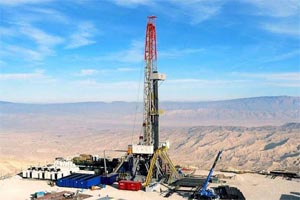
A good-sized gas discovery in Kalat
Amid a growing gas crisis in the country, Pakistan Petroleum Limited (PPL) has stumbled upon what can easily be deemed as fairly decent gas reserves deep in the Balochistan province. The discovery of hydrocarbons, though significant in itself, promises to usher in a new chapter in the country’s oil and gas exploration sector. As per initial estimates, the size of gas reserves is around one trillion cubic feet. “When we drill more appraisal wells, we can give an exact figure but based on the map that we have prepared and based on the column of gas that has come, the volume is close to one trillion cubic feet,” the PPL MD said. Sharing details, he said that the column had around 55% of hydrocarbons and though they would have to set up a lot of plants, he was of the view that “this discovery has opened a new petroleum play in the country”. “We are going to drill another well soon, probably in the next six or seven months. But because of the location of the field, it is difficult to develop it at the pace we would have desired.” According to PPL MD, this was not just a single discovery but there were many other structures as well. “The hydrocarbon habitat has been confirmed,” he said, adding that once the gas discovery was made, chances of success increased. “PPL’s Margand findings are a landmark discovery. There will be a string of discoveries after this in this region.”
|
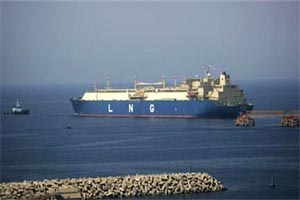
Govt for speedy setting up of LNG terminals
The federal cabinet on Sept 9, directed the petroleum and defence ministries to remove all hurdles within 30 days to facilitate setting up and operationalisation of two additional liquefied natural gas (LNG) processing terminals in the private sector. Under the decision taken at a cabinet meeting, the prime minister approved two proposals of the Ministry of Maritime Affairs and ordered immediate implementation. Special Assistant on Petroleum confirmed that the cabinet removed all obstacles. He said the two additional terminals required a total of 16 approvals and no objection certificates and 14 were already in place. The final two approvals have been cleared by the cabinet, he added. Informed sources said the cabinet ordered the Ministry of Defence to issue “NOC within thirty days for the establishment of two new LNG terminals at Port Qasim, Karachi” as precedents were available on record. Likewise, the Petroleum Division was directed to undertake and commit to the new terminal operators — Energas Terminal and Tabeer Energy — for allocation of LNG gas in the existing pipeline ‘on first-come first-serve basis’ and providing capacity to both the terminal operators in new planned gas pipeline within 30 days, so that formalities could be completed by the terminal operators.
|
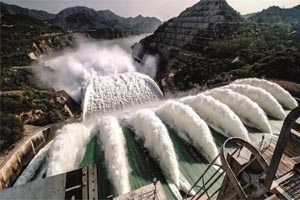
Tarbela 4th extension hydel power station crosses 10b units generation
Tarbela 4th Extension Hydel Power Station crossed 10 billion units generation mark, as it has contributed 10.021 billion units to the National Grid. This contribution of Tarbela 4th Extension Hydel Power Station yielded revenue of about Rs75 billion to WAPDA. Simultaneously, it also accrued saving worth Rs100 billion to the national exchequer, which would otherwise have been borne to generate same quantum of electricity through thermal resources. Tarbela 4th Extension Hydel Power Station has been instrumental in meeting electricity needs of Pakistan, triggering socio-economic development in the country. The project has been constructed on Tunnel No. 4 of Tarbela Dam. It has three generating units, each of them having capacity of 470 MW. With completion of Tarbela 4th Extension Hydropower Project, the installed capacity of Tarbela Hydel Power Station has increased from 3478 MW to 4888 MW. World Bank has termed Tarbela 4th Extension as the flagship project of WAPDA.
|
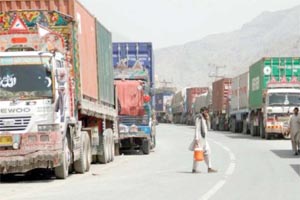
Afghanistan-bound: 15,000 containers stuck in Pakistan
About 15,000 Afghanistan-bound shipping containers, which are more than double the normal number, have been stuck at Pakistan’s seaport en route to their final destination due to administrative hiccups and mismanagement. The mishandling of Afghanistan-bound cargo has increased the cost of doing business for traders and transporters on the one hand and could adversely affect the already sinking exports on the other hand, background discussions with all the stakeholders revealed. Every stakeholder involved in the chain, the Federal Board of Revenue (FBR), the transit trade cargo tracking company and the terminal operator - National Logistics Cell (NLC), put the responsibility on others. However, the sufferers are Pakistani exporters, Afghanistan’s importers and transporters. The closure of Pak-Afghan border during peak time of Covid-19 and subsequent decision by the FBR to ensure 100% scanning of Afghan cargo led to a situation where about 15,000 shipping containers have been stuck, said an official of tracker company. These include about 3,500 containers en route to their destination, which can be seen standing around Peshawar city and Chaman and Torkham border posts. Illegal checking points before the border posts also aggravated the situation, which FBR officials claimed were dismantled last week.
|

Fitch Ratings forecasts C/A deficit widening to 1.7 pc in FY20
Rating agency Fitch Ratings expected Pakistan’s current account deficit to widen to 1.7 percent of GDP in the current fiscal year from 1.1 percent a year ago as it forecasted downward trend in remittances inflows. “The expected shock to remittances could exacerbate existing challenges for countries with fragile external finances, such as Pakistan and Sri Lanka,” Fitch Ratings said in a report on the impact of coronavirus on remittances. The rating agency said the pandemic and oil price shock have driven sharp economic contractions and fiscal deteriorations worldwide, including in the Gulf – a major source of remittances for the region. “Lower remittances will most likely widen current account deficits, contributing to higher external financing needs,” it said. “The fall in remittances is likely to compound the already severe impact of the Covid-19 shock on economic growth.”
|
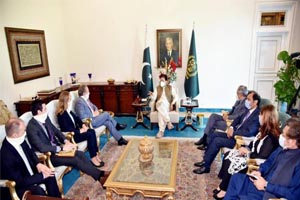
Australian firm to transfer technology to Pakistan
Adviser to Prime Minister on Commerce and Investment Abdul Razak Dawood on Monday, Sept 7, hailed Australian inventors for injecting capital into different sectors of Pakistan. During a meeting with a delegation of Fortescue Metals Group Limited, headed by Group Chairman Andrew Forrest, Dawood said the approach of Fortescue Group was unique and it would result in transfer of knowledge and technology to Pakistan. He added that the workforce of Pakistan was quite capable of learning and adopting new technologies quickly and the investment would result in improving the labour market. In the meeting, the Fortescue Group gave a presentation on its proposed plans for investing in Pakistan. It revealed that Pakistan was one of the shortlisted countries, which were being actively explored for investments. Forrest appreciated the support and enthusiasm of the government of Pakistan. He said the investment would focus on green industry, starting from generation of hydroelectric power and development of industry in the associated land, which would be owned and operated by the group with the help of local partners. He said the group intended to invest in Pakistan to introduce new technologies with zero carbon emissions, particularly green fertiliser and green steel production plants. .
|
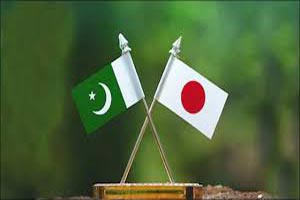
Japanese businessmen unveil $100mln investment plan for Pakistan
Pak-Japan Business Council (PJBC) is keen to invest at least $100 million in industrial zones in Pakistan in line with the interest of Japanese government and private sector to strengthen bilateral economic cooperation, its top official said. According to the president of PJBC the Japan-based nonprofit association would put the investment plan before Punjab Governor who is scheduled to visit Japan in the last week of this month. “We will discuss the plan of investment in the Punjab’s industrial zone with the governor during his upcoming visit,” said president PJBC. PJBC was formed to help business communities in Pakistan and Japan, promote interests of global companies, small and medium-sized enterprises, and academic and government organisations engaged in the Pakistan-Japan corridor. The PJBC provides both the countries network access and influence required to initiate business development, and innovate businesses, products, services and ideas. A consortium of two of the Japan’s largest information technology firms unveiled major investment plans for Pakistan amid a rising demand of industry professionals. These companies already visited Pakistan in December last year and held meetings with several stakeholders in the country. They wanted to launch a financial technology project in Pakistan and introduce digital payment tools.
|
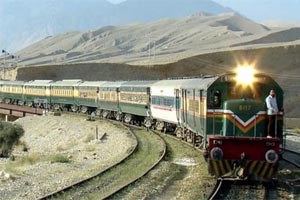
Railways to invite bids for $6.8bn ML-1 CPEC project
Pakistan Railways (PR) is all set to invite bids to tender for the country’s first and biggest transport sector project —Main Line-1 (ML-1) — from Sept 12. Bidding documents have been prepared. The completion of USD 6.8 billion project titled “Up-gradation of ML-1” has been divided into three separate packages —Nawabshah to Rohri / Sukkar, Multan to Lahore & Walton Academy and Lahore to Lalamusa & Kaluwal to Pindora sections. Through invitation of bids which will be made public from September 12, the railways ministry will seek expression of interest for up-gradation of the aforementioned packages of the ML-1 in EPC (Engineering, Procurement & Construction) mode from eligible Chinese firms on the basis. Details on the financing arrangements are still unclear. The invitation for bids simply says the “project will be funded under CPEC financing arrangement through loan from Chinese Financial Institutions and partly funded by Government of Pakistan.” “Under the framework agreement signed between People’s Republic of China and the Government of Islamic Republic of Pakistan, only Chinese companies / consortia are eligible to participate in the bidding process, the invitation reads. The PR has also set a deadline of October 22 for submission of bids for the project.Only Chinese firms to be eligible for bidding.
|

Industries minister, manufacturers called to explain reasons of cars’ higher prices
While expressing concerns over the rising prices of automobiles in the country, a parliamentary committee on Thursday has decided to call Federal Minister for Industries and Production and representatives of automobile manufacturers in next meeting to explain the reasons of higher prices. Senate standing committee on Industries and Production, which met and discussed the issue of rising cars prices in the country. The committee members have noted that automobile companies are increasing the prices without brining any improvement or additional facilities in the vehicles. They said that people could not think to buy new cars due to their higher prices. The committee noted that companies are increasing the prices at their own. They noted that companies always increased the prices of cars by making the excuse of increasing dollar value and government’s taxes. Member of the committee said that there is no authority in the country, which could control the vehicles prices. He said that automobile manufacturers had not taken any measures for local production of the cars, which are made by importing their spare parts from other countries. Quoting the report of Competition Commission of Pakistan, he said that automobiles had received more than Rs6,000 billion from the consumers in Pakistan. He said that prices of cars are almost double in Pakistan as compared to India and Bangladesh.
|
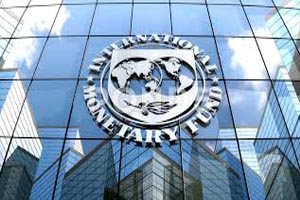
IMF wants Pakistan to up power, gas tariffs
The International Monetary Fund (IMF) has again turned up the pressure on Pakistan, asking it to increase power and gas tariffs for the revival of the stalled $6 billion programme. The global lender has contacted Pakistani authorities to convey its demands, sources said on Sept 10. The sources added that the IMF had called for measures to reduce circular debt and power losses. The IMF has also demanded that the National Electric Power Regulatory Authority (Nepra) and the Oil and Gas Regulatory Authority (Ogra) should be allowed to make independent decisions on tariffs. It has also stressed the need to implement tax reforms. The Pakistani authorities have been told that it was imperative to meet the tax collection target of around Rs1 trillion during the period between July and September. The IMF has not approved the second review of the 39-month Extended Fund Facility worth $6 billion since February this year due to disagreement over additional tax measures and increase in electricity prices. The IMF’s concerns about the viability of Rs4.963 trillion tax collection target for the new fiscal year 2020-21 are in line with the views of independent experts who have also termed the tax collection target unrealistic.
|

Pakistan, China to ink Rashakai SEZ deal
Pakistan and China are expected to ink an agreement on Sep 14 on the development of the Rashakai Special Economic Zone under the China-Pakistan Economic Corridor (CPEC). The agreement is expected to be signed during a ceremony scheduled to take place at the Prime Minister House in Islamabad. This agreement provides the road map for the establishment of an SEZ while holding the federal and provincial governments and the developer jointly responsible for the development and successful operations of an SEZ. The Rashakai SEZ will be developed under a public-private partnership by the Khyber-Pakhtunkhwa (K-P) Economic Zone Development and Management Company (KPEZDMC) in collaboration with the China Road and Bridge Corporation. The $128 million projects, sprawling over 1,000 acres of land, was awarded the SEZ status on August 6, 2019, and its Concession Agreement was signed in April 2019. The Rashakai SEZ has an advantage due to its proximity to the first juncture of CPEC route, and significant resource and manufacturing base in the region. The federal government has committed Rs1.8 billion for provision of 210 megawatts of electricity, and Rs1.2 billion for the provision of 30 mmcfd gas from the federal PSDP.
|
|

© 2020 Alpine Marine Services Private Limited
all rights reserved
|
|
|